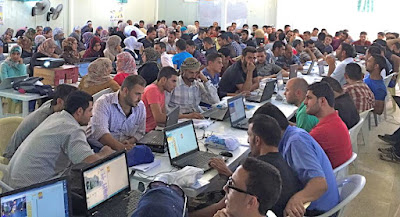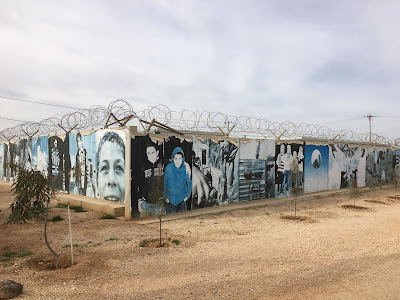I have been in Jordan before, teaching coding in schools, universities and in the huge Syrian refugee camp at Za'atari (photo) with my good friends Batoul, Ibi, Claire, Bernard, Bruno, Kevin, Nuala and Shadi.
Yesterday I was supposed to have travelled back to Jordan to present at a UNESCO conference along the shores of the Dead Sea.
My presentation at the ‘Global Media and Information Literacy Week’ conference was, in a time of fake news, online hostility and abuse, to showcase a pioneering good news digital literacy project that was part of a process of bringing hope, creativity, togetherness and positive change across an entire continent.
I was so excited to be doing so!
For since it was established in 2015, the Africa Code Week initiative led by SAP and through a partnership of Camden Educational Trust, UNESCO, Association for the Development of Education in Africa, Irish Aid, multiple African governments and grassroots NGOs, has taught over 100,000 teachers and millions of youth in 41 countries how to become proficient in coding. But it has also through its programmes promoted cultural diversity and respect, inclusivity, female empowerment, art as a learning medium, awareness of the importance of the natural environment, sustainability, innovation, technology skill sets, and delivering an learning environment that is enjoyable, practical, holistic and meaningful to participants.
But today I find myself in Ireland and not in the Middle East. The war in Gaza understandably led to the cancellation of the conference by UNESCO and the Jordanian government.
So my prayers and thoughts are with the Palestinian, Lebanese and Israeli peoples at this very dangerous time. Especially with the residents of Gaza who are living in what is the world’s largest concentration camp being denied water, food, electricity, fuel, education and human dignity whilst their homes and neighbourhoods are being pulverised.
I have worked in Palestinian and Syrian refugee camps in Lebanon and Jordan, with refugees in Egypt and Turkey, taught in schools in the Hezbollah stronghold of Nabatieh, and met with Jews whose parents or grandparents survived the Nazi Holocaust in Europe and the pogroms of Yemen, Iraq and North Africa.
In spite of the suffering I have often seen, I am always inspired by the unbelievably good and kind people I met who in the most terrible circumstances keep on trying to help others.
I am inspired too when I witness over the last week Jewish people marching in the hundreds sometimes in their thousands on the streets of New York, Washington and London demanding justice for their Muslim, Christian and secular Palestinian neighbours and an end to the brutal occupation of the West Bank and the destruction of Gaza.
The Middle East belongs to all of its peoples be they Jew, Shia, Sunni, Christian, Yazidi, Alawite or atheist. There has to be a lasting just peace for all.
But sadly we are living in dangerous times when conflict and war are on the rise due to the machismo arrogance of egotistical male leaders who use differences of religion, race and political ideology to promote division, hate and fear in order to retain power.
In the last few years, we have witnessed ethnic cleansing in Ukraine, Myanmar, Syria, Iraq, Palestine and Nagorno Karabakh; tribal lands being stolen in Brazil and India; women being reduced to becoming the property of men in Afghanistan and being treated as second class citizens in Iran; democracy being snuffed out in Hong Kong; the rise of intolerant misogynistic fundamental strands in many religions; our oceans being militarised; fossil fuel companies corrupting the political system in the USA and worldwide; the leaders of some powerful western and Arab countries destroying Libya, Iraq and Afghanistan; and in the case of USA, UK, France and the EU Commission President Ursula von der Leyen, giving complete backing to the most right-wing government in the history of Israel; and witnessing the natural world being destroyed at an ever-increasing rate.
There has been exposure too in the courts of Ireland and across the world of how powerful male clerics of my own Christian Catholic religion have been responsible for the most heinous crimes against untold defenceless innocent children.
Yet I am still an optimist. I wholeheartedly believe in the goodness of ordinary everyday people. I believe in a future where all states are secular, which respects all religions but gives preference to none; that has equality for all sexes, race and creed and where the rule of law exists to protect the citizen from the oppressor; where Climate Change, biodiversity protection, sustainability and social justice is central to all government policies and where all technological innovation, products and processes have to be benign or else they are withdrawn.
In a world where over one million species face extinction due to our behaviour and where our time as a species is running out, we need to recognise the rest of humanity as our brothers and sisters and the planet as our mother.
This can be done if we fully implement the 17 Sustainable Development Goals and the Charter of the United Nations-they provide a pathway for us all to follow.
Please look closely at the people in the photo- they are wonderful men, women and children who were forced to flee their homeland of Syria to live in a refugee camp (Za’atari) in Jordan. It was not their choice-they left behind jobs, friends, dreams and so much more to escape persecution and death to live in a camp in a desert.
P.S. Apologies if this piece reads as a naïve and rambling narrative. But I just decided this evening to sit down and write something about how I felt about the state of the world.










